Events
Events Description should display here.
#SBDH19 All Hands Meeting April 9 - 10, 2019
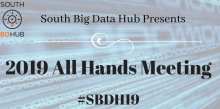 Thank You to the South Hub Community for an Incredible Meeting.
Thank You to the South Hub Community for an Incredible Meeting. CI Working Group Call
 CI Working Group Call
CI Working Group Call Earth observation and citizen science workshop video materials now available
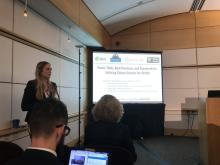 The proliferation of mobile devices and low-cost sensors has enabled citizens to collect timely geospatial information and contribute to scientific research and fieldwork that addresses locally relevant, global environmental issues, including disaster management, food security, and climate change. This collaborative exchange, in which citizens as well as scientists and policymakers, actively participate in the creation of new scientific knowledge, is called citizen science to contribute, together with scientists and policymakers, to address locally relevant, global environmental issues, including disaster management, food security, and climate change. This collaborative exchange, in which citizens are active participants in the co-creation of new scientific knowledge, is known as Citizen Science. If you missed the citizen science workshop or want to review the content that was presented there, SWF has posted the workshop agenda, video and links to the slides of presenters.
The proliferation of mobile devices and low-cost sensors has enabled citizens to collect timely geospatial information and contribute to scientific research and fieldwork that addresses locally relevant, global environmental issues, including disaster management, food security, and climate change. This collaborative exchange, in which citizens as well as scientists and policymakers, actively participate in the creation of new scientific knowledge, is called citizen science to contribute, together with scientists and policymakers, to address locally relevant, global environmental issues, including disaster management, food security, and climate change. This collaborative exchange, in which citizens are active participants in the co-creation of new scientific knowledge, is known as Citizen Science. If you missed the citizen science workshop or want to review the content that was presented there, SWF has posted the workshop agenda, video and links to the slides of presenters. Confronting the data challenges of 'smart health'
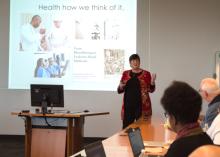 Each day countless devices—from monitors in hospitals to diagnostic tests to Fitbits—capture huge amounts of health data. That data could change how patients and doctors interact, how diseases are diagnosed and treated, and the amount of control individuals have over their health outcomes.
Each day countless devices—from monitors in hospitals to diagnostic tests to Fitbits—capture huge amounts of health data. That data could change how patients and doctors interact, how diseases are diagnosed and treated, and the amount of control individuals have over their health outcomes. Mobile Health Workshop sparks ideas for future research
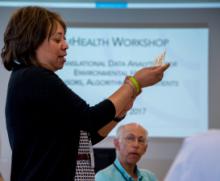 Participant recap of the mHealth Workshop, held in Chapel Hill, NC in May 2017. The workshop was supported by the South Big Data Hub and the National Consortium for Data Science (NCDS). Wenbin Zhang is a first-year PhD student in the department of information systems at the University of Maryland, Baltimore County. He attended the South Big Data Hub/NCDS Mobile Health Workshop in May with travel support from the South Hub.
Participant recap of the mHealth Workshop, held in Chapel Hill, NC in May 2017. The workshop was supported by the South Big Data Hub and the National Consortium for Data Science (NCDS). Wenbin Zhang is a first-year PhD student in the department of information systems at the University of Maryland, Baltimore County. He attended the South Big Data Hub/NCDS Mobile Health Workshop in May with travel support from the South Hub. Separating the wheat from the chaff in an age of bots and trolls
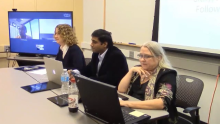 In the age of ubiquitous connectivity and social media, information is at our fingertips. Unfortunately, so is misinformation and often it is hard to tell one from the other.
A recent roundtable discussion sponsored by the South Big Data Hub examined the rapidly changing landscape for building online communities, sharing information, and creating what often appears to be a groundswell of support for particular points of view.
In the age of ubiquitous connectivity and social media, information is at our fingertips. Unfortunately, so is misinformation and often it is hard to tell one from the other.
A recent roundtable discussion sponsored by the South Big Data Hub examined the rapidly changing landscape for building online communities, sharing information, and creating what often appears to be a groundswell of support for particular points of view. South Hub Sponsors Materials and Advanced Manufacturing Workshop
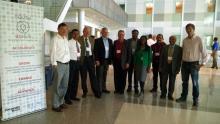 On August 25, nearly sixty people gathered for a workshop on Data Infrastructure for Materials and Advanced Manufacturing.
On August 25, nearly sixty people gathered for a workshop on Data Infrastructure for Materials and Advanced Manufacturing. 
